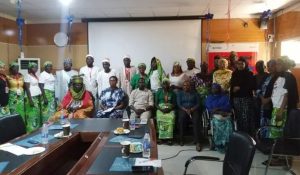
The Nigerian Institute of Architects (NIA) and the Federal Ministry of Housing and Urban Development have reaffirmed their commitment to addressing Nigeria’s housing deficit while promoting sustainability in urban development.
During a courtesy visit by the NIA leadership to the Ministry, Dr. Shuaib Belgore, the Permanent Secretary, emphasized the critical role of collaboration in achieving affordable, sustainable, and eco-friendly housing solutions. He highlighted that the Ministry’s objectives align with the concerns raised by the NIA, including housing shortages, urban planning, and community engagement. Belgore welcomed the institute’s partnership in fostering environmentally responsible urban development.
NIA President Mobolaji Adeniyi reiterated the institute’s dedication to sustainable housing solutions through strategic collaboration with the Ministry. He underscored the importance of integrating green building techniques, utilizing renewable and locally sourced materials, and enhancing community engagement to create inclusive and resilient urban spaces.
Adeniyi also advocated for the transfer of the Building Materials Standards Organisation from the Standards Organisation of Nigeria to the Housing Ministry. He argued that this move would strengthen regulatory oversight, curb the proliferation of substandard materials, and mitigate the rising cases of building collapses across the country, thereby ensuring a more sustainable and safer built environment.
Read also: Housing Deficit Crisis in Nigeria
Belgore acknowledged the issue of building collapses, particularly in newer constructions, and stressed the need for improved quality control and adherence to sustainable building standards. He outlined the Ministry’s efforts to standardize certification for construction artisans, stating, “We are building schools, and we want to ensure that every artisan is properly trained and certified in sustainable building practices.”
Additionally, Belgore revealed that the Ministry is exploring the establishment of an agency to oversee building material standards, ensuring that all materials meet eco-friendly and sustainability benchmarks. This agency would be responsible for issuing standard certification for building materials, reinforcing quality control, and promoting environmental responsibility in the construction industry.
Reaffirming the Ministry’s commitment to teamwork in addressing national housing challenges, Belgore emphasized the importance of profiling construction workers based on their expertise, competence, and adherence to sustainable practices. He highlighted that a structured approach to workforce development is crucial for achieving long-term, environmentally sustainable housing solutions in Nigeria.
The partnership between the NIA and the Ministry represents a significant step toward enhancing regulatory frameworks, ensuring quality construction, and promoting sustainability in urban development. By prioritizing eco-friendly building techniques and responsible urban planning, this collaboration seeks to drive lasting change in Nigeria’s housing sector.







